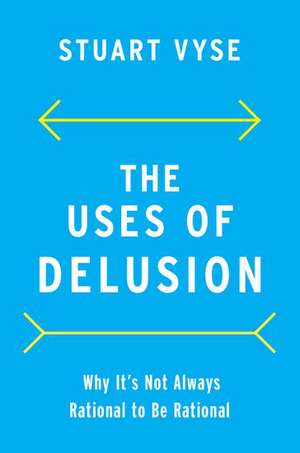The Uses of Delusion: Why It's Not Always Rational to Be Rational
Autor Stuart Vyseen Limba Engleză Hardback – dec 2022
Preț: 170.89 lei
Preț vechi: 196.63 lei
-13% Nou
Puncte Express: 256
Preț estimativ în valută:
32.70€ • 35.63$ • 27.55£
32.70€ • 35.63$ • 27.55£
Carte disponibilă
Livrare economică 22-28 martie
Livrare express 18-22 martie pentru 52.29 lei
Preluare comenzi: 021 569.72.76
Specificații
ISBN-13: 9780190079857
ISBN-10: 0190079851
Pagini: 216
Dimensiuni: 152 x 226 x 25 mm
Greutate: 0.43 kg
Editura: Oxford University Press
Colecția OUP USA
Locul publicării:New York, United States
ISBN-10: 0190079851
Pagini: 216
Dimensiuni: 152 x 226 x 25 mm
Greutate: 0.43 kg
Editura: Oxford University Press
Colecția OUP USA
Locul publicării:New York, United States
Recenzii
Vyse is an articulate and engaging writer, and his argument is illustrated at points by graphic figures and diagrams to assist readers' comprehension of key concepts, such as rational choice theory.
Many books have lamented human superstition, overconfidence, and self-defeating beliefs, but The Uses of Delusion offers a counterpoint: the benefits of these "irrational" mechanisms in our lives. The result is a fuller picture of how humans think—and why, too often, we don't.
With his usual crisp and delightful prose, Vyse explores the tension most of us feel between our rational and irrational impulses. Why the latter can have so much sway has never been more important to understand given the growing chorus of voices turning away from the enlightenment. Vyse makes it easier to fathom parts of this disturbing trend.
Those of us who have devoted our careers to promoting science, reason, and rationality rarely consider the times and circumstances when it is rational to be irrational, reasonable to be unreasonable, and even use science to determine when it is appropriate to be unscientific in our lives. In The Uses of Delusion our nation's foremost expert on superstition and magical thinking turns his rational eye to revealing the context of this apparently paradoxical behavior. I actually felt a sense of relief in understanding why I need not berate myself for the many times I have caught myself being unreasonable, irrational, and unscientific in my life, because as Stuart Vyse shows in this important contribution to the science of rationality, there are times when it pays to be irrational.
Many books have lamented human superstition, overconfidence, and self-defeating beliefs, but The Uses of Delusion offers a counterpoint: the benefits of these "irrational" mechanisms in our lives. The result is a fuller picture of how humans think—and why, too often, we don't.
With his usual crisp and delightful prose, Vyse explores the tension most of us feel between our rational and irrational impulses. Why the latter can have so much sway has never been more important to understand given the growing chorus of voices turning away from the enlightenment. Vyse makes it easier to fathom parts of this disturbing trend.
Those of us who have devoted our careers to promoting science, reason, and rationality rarely consider the times and circumstances when it is rational to be irrational, reasonable to be unreasonable, and even use science to determine when it is appropriate to be unscientific in our lives. In The Uses of Delusion our nation's foremost expert on superstition and magical thinking turns his rational eye to revealing the context of this apparently paradoxical behavior. I actually felt a sense of relief in understanding why I need not berate myself for the many times I have caught myself being unreasonable, irrational, and unscientific in my life, because as Stuart Vyse shows in this important contribution to the science of rationality, there are times when it pays to be irrational.
Notă biografică
Stuart Vyse, PhD, is a behavioral scientist, teacher, and writer. He taught at Providence College, the University of Rhode Island, and Connecticut College. Vyse's book Believing in Magic: The Psychology of Superstition won the 1999 William James Book Award of the American Psychological Association. He is a contributing editor of Skeptical Inquirer magazine, where he writes the "Behavior & Belief" column, and a Fellow of the Association for Psychological Science and of the Committee for Skeptical Inquiry.
